Democracy and citizenship continue to evolve, spurred by new threats and new opportunities. In order to exert some control over these changes, we need to understand the nature of the threats and how they developed, the shifts in how people are thinking about politics and community, and the democracy innovators and innovations that are emerging today. This series of essays, released in advance of The Future of Citizenship: The 2023 Annual Conference on Citizenship, aims to set the stage for a national discussion on where our country is headed.
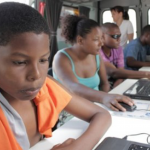 Riding the Waves of Democracy Innovation
Riding the Waves of Democracy Innovation
Several recent waves of innovation have carried citizens, communities, and institutions to our current position: a point where we have to make some significant decisions about how we want to govern our communities and country. And we have to face them now, before the next wave of innovation and complexity makes those decisions even more difficult.
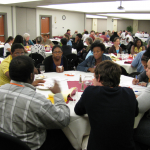 Local Civic Leaders: Facing Threats to Democracy in Communities
Local Civic Leaders: Facing Threats to Democracy in Communities
By examining the work of local civic leaders, we can get a better sense of what is happening to democracy, including the threats we face and what we might do about them. Local civic leaders are up-close observers of political polarization, racism, and economic inequality, and they are on the front lines of many efforts to address these challenges. The democracy-saving and -enhancing capacities of these leaders – as well as the weaknesses and limitations they face – can be instructive for all kinds of efforts to make democracy more inclusive, participatory, and equitable.
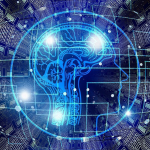 The Rise of Subconscious Technologies
The Rise of Subconscious Technologies
Most of the dangers and opportunities we face have to do with the growing sophistication of what we are calling “subconscious technologies” and the increasing determination among citizens to make their actions and opinions matter in public life, an impulse we are calling “conscious engagement.” These two forces are rampant, and the ways in which they conflict with or complement one another may be critical to the future of politics and democracy.
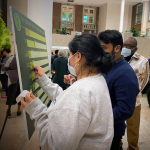 How Citizens Are Trying to Matter in 21st Century Democracy
How Citizens Are Trying to Matter in 21st Century Democracy
Conscious engagement is driven by the desire to matter. Citizens seem less inclined to pursue some of the traditional opportunities for engagement, such as attending official public meetings, and are pursuing new avenues for engagement and taking advantage of new technologies to do so. A common theme of these forms of participation is that they seem to fit the needs and motivations of citizens more than other opportunities. This essay will explore five ways citizens have been pursuing new ways of mattering.
 The Internet Knows Where You Are
The Internet Knows Where You Are
By connecting to people where they are and where they live, activists, officials and other leaders can advance their causes in ways that are more direct and “in your face” – and in ways that leverage political power because they fit the geography of political jurisdictions. This is making political conflict more extreme and more personal. It raises new questions about the rules of the game, the role of tech corporations in the public square, and whether these new conditions also present possibilities for bridge-building and compromise.
 Can Your Data Save Your Life? Privacy, Profits, and Population Health
Can Your Data Save Your Life? Privacy, Profits, and Population Health
Collectively, our health may depend on how we balance the dangers and benefits of health data, and whether citizens, governments, and corporations can negotiate mutually satisfactory agreements on privacy, profits, and data collection.
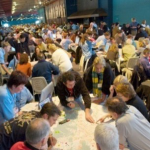 Power to the People! (But What Will They Do With It?)
Power to the People! (But What Will They Do With It?)
Democracy innovations that circulate information and support deliberation often conclude with non-binding referenda or recommendations that public officials are unwilling or unable to use. Meanwhile, regular elections seem increasingly vulnerable to manipulations like micro-targeting and misinformation. We have deliberation without power, and power without deliberation.
 Why Progressives and Conservatives Don’t Get Democracy—And Why They Should
Why Progressives and Conservatives Don’t Get Democracy—And Why They Should
Both progressives and conservatives are missing an opportunity. When citizens are presented with practices and reforms that would give them a more meaningful say in public decisions, they respond with enthusiasm. Giving power to citizens is a message that seems to translate well on the campaign trail. Engaging citizens this way has another advantage: It works.
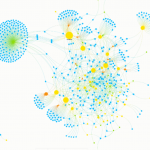 Mapping the Healthy Democracy Ecosystem
Mapping the Healthy Democracy Ecosystem
The Healthy Democracy Map will help identify, categorize, and quantify existing organizations and networks within the American democracy space so that donors, thought leaders, and civic organizations can better understand how to invest strategically, connect disparate efforts, and articulate a comprehensive vision for the future of our democracy.
 Directions for Democracy Innovation in a Conscious/Subconscious World
Directions for Democracy Innovation in a Conscious/Subconscious World
In an increasingly conscious/subconscious world, people have different expectations and can make new kinds of contributions to public decision-making and problem-solving. They can also be manipulated and maltreated in ways so subtle they cannot be easily recognized. To meet these challenges and opportunities, we need to build things – agreements, charters, technologies, institutions – that balance the needs of the individual with the good of society. Can democracy become a self-correcting system that will save us from our worst impulses? Even in its faltering, incomplete forms, even in its beta versions, it remains our most ingenious invention. To keep it, we will need to upgrade it – and to do that, we must be as realistic, constructive, and imaginative as possible.



